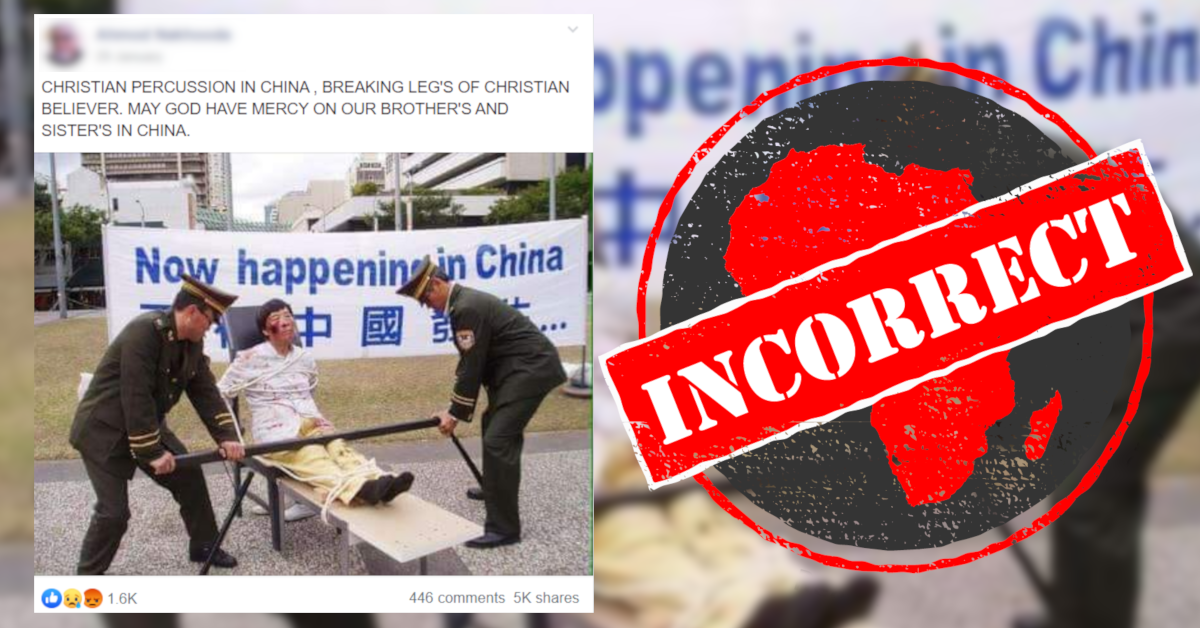A Facebook user has posted a photo with a claim that it shows the persecution and torture of a Christian in China.
In the photo, a man with his hands tied behind his back, his face and shirt seemingly covered in blood, is seated straight-legged on a bench. Two uniformed men on either side of him appear to be crushing his legs with a metal rod. A banner behind the trio reads: “Now happening in China.”
The photo is captioned: “Christian percussion in China. Breaking legs of Christian believer. May God have mercy on our brothers and sisters in China.”
The post was shared on a Zambian Facebook group page. But is it real?

The photo actually relates to the alleged persecution of a different group in China.
A reverse image search reveals that it was posted online on 16 July 2004, on the site Falun Dafa Minghui.org. Falun Dafa, also called Falun Gong, is a spiritual practice banned in China since 1999.
According to the article, the photo is one of many taken during an exhibition in Brisbane, Australia, on 10 July 2004.
“Dafa practitioners” held a “large-scale anti-torture exhibition” to “expose the brutal persecution of Falun Gong practitioners in China”, it says.
“The torture scenes were so true-to-life that they shocked many people who stopped to take a look at the exhibition.”
The photo does not show the torture of a Christian in China. Instead, it depicts a staged demonstration, in Australia, of the alleged torture of Falun Dafa adherents in China. – Dancan Bwire
In the photo, a man with his hands tied behind his back, his face and shirt seemingly covered in blood, is seated straight-legged on a bench. Two uniformed men on either side of him appear to be crushing his legs with a metal rod. A banner behind the trio reads: “Now happening in China.”
The photo is captioned: “Christian percussion in China. Breaking legs of Christian believer. May God have mercy on our brothers and sisters in China.”
The post was shared on a Zambian Facebook group page. But is it real?

Demonstration of torture staged in Australia
The photo actually relates to the alleged persecution of a different group in China.
A reverse image search reveals that it was posted online on 16 July 2004, on the site Falun Dafa Minghui.org. Falun Dafa, also called Falun Gong, is a spiritual practice banned in China since 1999.
According to the article, the photo is one of many taken during an exhibition in Brisbane, Australia, on 10 July 2004.
“Dafa practitioners” held a “large-scale anti-torture exhibition” to “expose the brutal persecution of Falun Gong practitioners in China”, it says.
“The torture scenes were so true-to-life that they shocked many people who stopped to take a look at the exhibition.”
The photo does not show the torture of a Christian in China. Instead, it depicts a staged demonstration, in Australia, of the alleged torture of Falun Dafa adherents in China. – Dancan Bwire
Republish our content for free
For publishers: what to do if your post is rated false
A fact-checker has rated your Facebook or Instagram post as “false”, “altered”, “partly false” or “missing context”. This could have serious consequences. What do you do?
Click on our guide for the steps you should follow.
Publishers guideAfrica Check teams up with Facebook
Africa Check is a partner in Meta's third-party fact-checking programme to help stop the spread of false information on social media.
The content we rate as “false” will be downgraded on Facebook and Instagram. This means fewer people will see it.
You can also help identify false information on Facebook. This guide explains how.


Add new comment